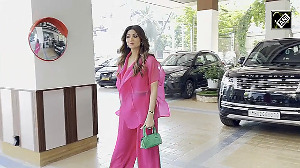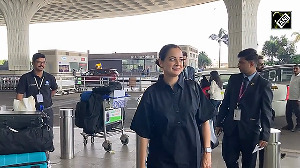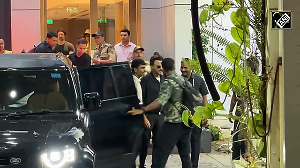'I wanted people to know that women across all ages have an exciting life.'

Tahira Kashyap Khurrana's long last dream came true when her debut feature film Sharmajee Ki Beti released on Amazon Prime Video.
It was not easy, as it took her seven years to see it on screen.
But film-making is not new to her.
Tahira made her first short film Toffee in 2017, followed by a segment called Pinni in the Web series Zindagi in Short in 2020, and then directed Quaranteen Crush in the Web series Feels Like Ishq in 2021.
"Badi mushkil se main yahan pauchi hoon, yahaan se mujhe dhaka mat do. (After a lot of struggle I have reached here, don't push me away now),' Tahira tells Patcy N/Rediff.com. "This is what I want to do for the rest of my life."
Sharmajee Ki Beti must have been your dream ever since your first short film released.
Yes. It took seven years, so it feels beautiful.
I am overwhelmed and numb at the same time.
The film got released last year at MAMI and received a lot of love. Now, it has released on Amazon Prime Video.
It's been a very beautiful journey, a long one, but nonetheless gratifying.
Why did you think of taking the stories of three betis (Sakshi Tanwar, Divya Dutta and Saiyami Kher) rather than going indepth with just one?
There was so much I wanted to say!
Mujhe pata nahi tha mujhe dobaara maukaa milegega ki nahi milega film banane toh mujhe sab kuch kehna tha... (I was not sure whether I would get another chance to make a film, so I wanted to say everything).
Also, I did not want to give one woman all the problems.
I wanted to make a happy film.
The most organic thing was to have women from different age groups. My intention was to capture women who are below 20 and above 28.
Usually in the film industry, we only see women in this age bracket.
When they age, they cease to exist.
That's why I wanted to cover all the age groups.
I wanted people to know that women across all ages have an exciting life.

In the film, Divya Dutta is a good mother and an understanding wife. She pulls herself together when her husband cheats on her. Sakshi Tanwar's working mother character seems to neglect her daughter. Saiyami Kher's character seems to be the weakest, as she is a cricketer who is treated like a doormat by her partner.
What was going through your mind when you wrote these characters?
Art is very subjective, and this is your point of view.
The kind of responses I'm getting is not just that one character is a clear favourite.
They are different characters, and it's about which character lands the most for you.
I knows a couple of 20 year olds, like my ex-manager, who had a toxic relationship. Of course, this is not based on her life because I wrote it seven years back.
She messaged me saying that she could relate to Saiyami Kher's character because it was less to do with cricket and more about her realising her self-worth.
The boy could be a green flag in terms of loving his girlfriend but he was a toxic guy, who didn't have any faith in her job.
He had a particular definition of being feminine, like he had a problem with her big appetite...
The women in these stories do not have earth-shattering issues; most of the issues stem from self-worth.
There is no issue between Divya's character and her daughter, Swati. Swati is being immature but the issue comes from Jyoti doubting herself because society looks down upon working women, especially in the middle class.
You feel Sakshi was neglecting her daughter but it was not neglect. She was just living her life but the daughter felt neglected because she has expectations.
That's how I felt as a child.
I call myself a feminist but when I was a child, my parents were working but my expectations were from my mother only. Whatever my father did was a bonus, and that's not cool.
These women doubted their self-worth. It could be the smallest of the issues but they determined their life and happiness.
But I will surely work better on my next one.

Did you always want to write on a women-centric topic?
When you have films where men are shining, we don't call them men-centric films. We just call them films.
In this, my women are shining and the men are in supporting characters, but why do we call it a female-centric film?
The idea is to make good films with characters and stories.
There should be more representation of women and their stories.
My first choice was women, and issues related to them.
Was it difficult to get funds because the film is about women?
Yes. That's why it took seven years to make it.
Fortunately, the topic is still relevant, and people are loving it and finding it fresh.
Unfortunately, if it's relevant, it means that many women are still facing this problem.
It took a lot of time until Applause Entertainment came on board. They loved the script, and it didn't matter to them that women were leading.

Did you ever feel discriminated against due to your gender?
Very honestly, no. But it's not like I haven't heard about it.
What I have seen is that when a man comes on a set, he automatically commands respect by virtue of his gender but a woman has to prove herself time and again in every phase of life, whether she is a director, or a reporter, or a mother.
Women have to win hearts and try harder as compared to men.
But does that rob you of opportunity? I know many female directors in the industry, and they are doing really well.
Sharmajee was delayed for many reasons: COVID, the lockdown, your cancer. What was going through your mind during these delays?
That's where your own philosophy and grounding helps you.
I'm into chanting and meditation, and that gives me calm and patience.
The other thing is that I don't know to give up.
There were a lot of frustrating days, when I would break down, but the next day, I would rise again.
Because what else is there to do? You have to keep hustling for yourself.
Also, I used this time to write more scripts.

So what next?
I am doing a film with Guneet Monga. And there's another one too.
You have worked in a radio station, taught mass communication in Mumbai, written books, written scripts, tried your hands at direction. What would you like to do next?
Badi mushkil se main yahan pauchi hoon, yahaan se mujhe dhaka mat do. (After a lot of struggle I have reached here, don't push me away now).
This is what I want to do for the rest of my life.
I want to write.
I want to direct.
I want to make films.
I have a lot of love for the craft.

Sharib Hashmi plays a supportive husband and hands-on father. Is Ayushmann Khurrana like that?
I like the way you connected Sharib with Ayushmann (Laughs)
I think I saw Sharib as my father.
My parents had this kind of relationship.
My father was a journalist, and would work in shifts.
So there were days when he would dress me up for school, as my mother was working.
He would run the errands that a mother would.
At that time, 99 percent of my friends had homemaker mothers, who would look into every aspect of their life.
My father was the most supportive husband I have seen, so that part of the story comes from there.
He would chop vegetables for mom, and she would cook.
Their roles were divided, as were the bills. The electricity bills would be paid by my father and my mother would pay the education bills.
It was so beautifully divided between them that now that they are retired, they are running their home based on their pensions and are beautifully contributing.

Since both Ayushmann and you are in the same field now, what are your dinner table conversations like?
We are very fortunate to have common areas of interest, so when we come home, there's a lot to talk about.
But when we talk, it's not work for us. It's something we both are very invested in.
He bounces off his scripts with me, and I do the same.
Our opinions matters to each other.
When will I direct him?
I don't know, he is a senior in the industry.
I need to write a script in which I see him, and it needs to be one that he likes.












 © 2025
© 2025